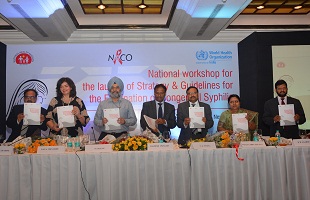
The national strategy and operational guidelines for the elimination of congenital syphilis were launched at a dissemination workshop jointly organized by the National AIDS Control Organization (NACO), Government of India and WHO Country Office for India on 25 February 2015.
Present on the occasion were Dr Jagdish Prasad, Director General Health Services, Government of India; Mr C.K. Misra, Additional Secretary and Mission Director, National Health Mission, Government of India; Mr N.S. Kang, Additional Secretary, NACO; Mr K.B. Agarwal, Joint Secretary, NACO; and Dr Nata Menabde, WHO Representative to India.
Congratulating the government for this timely and important initiative, Dr Menabde said, “Syphilis has become a significant public health problem globally. What is worrying is that despite the clear decline in syphilis prevalence in India over the last decade, recent estimates suggest that in 2012, 104 000 pregnant women were infected with syphilis causing 53 187 adverse pregnancy outcomes. This clearly can and must change as it is relatively simple to prevent and treat syphilis.”
“While we may have the best strategies and guidelines, they don’t fully realize their potential for lack of effective implementation. We need to guard against that. Operationalization and effective implementation of the strategy needs constant dialogue and coordination at all levels. We must ensure that,” she added.
Expressing his happiness at the launch of the strategy and guidelines to eliminate congenital syphilis, Mr C.K. Misra said, "Thank you for having started the process of integration of whatever NACO is already doing along with the established platform of the National Health Mission."
Syphilis is of particular concern in pregnancy because of the risk to transmit the disease from the infected mother to her foetus. Mother-to-child transmission (MTCT) of syphilis has caused a significant perinatal morbidity and mortality globally. Untreated maternal syphilis contributes to syphilis-associated pregnancy adverse outcomes including stillbirth and late foetal loss, neonatal death, premature and low-birth-weight infants, and congenital syphilis.
In 2007, WHO had launched the global initiative to eliminate congenital syphilis and in 2011, an initiative for the dual elimination of mother-to-child transmission of HIV and syphilis. These initiatives strived to reduce childhood mortality, improve maternal health and combat HIV/AIDS and STIs.
In India, syphilis screening was included in the essential ANC package (together with HIV testing) in 2014. This provided an opportunity to integrate this elimination programme into the existing Reproductive, Maternal New Born, Child Health plus Adolescent programme (RMNCHA+)
The national strategy and operational guidelines for the elimination of congenital syphilis bring together the essential interventions and an integrated platform between maternal health and NACO under the umbrella of the National Health Mission to target elimination of congenital syphilis.
The dissemination workshop was attended by officials from the Ministry of Health & Family Welfare, NACO and WHO; National Health Mission officials from different states; NGO’s and research organizations.
